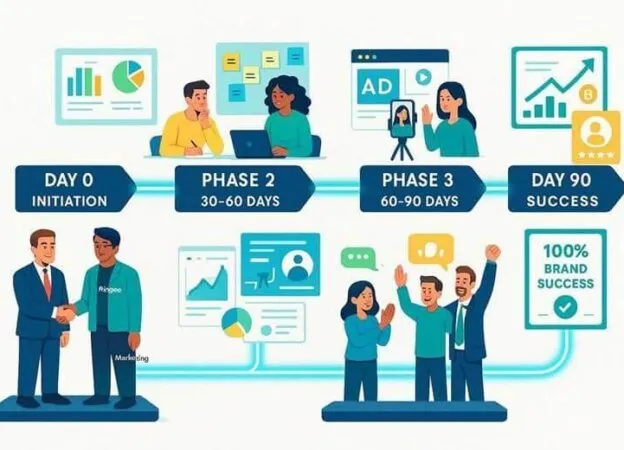Welcome to the dynamic realm of digital marketing, where building customer loyalty is not just a mere objective but an indispensable strategy for achieving triumph. In this rapidly changing landscape, businesses must surpass conventional efforts to ensure their patrons return for more.
With an abundance of choices readily available, the challenge lies in setting your brand apart from the rest. The solution lies in implementing impactful retention strategies that engage your audience and transform them into steadfast advocates.
Within this blog post, we will delve into essential tactics that can assist you in fostering enduring connections with your customers within the ever-evolving digital marketing era. So, let us embark on this journey together and explore how you can be building customer loyalty to unprecedented heights!
Table of Contents
Personalization
Gone are the days of mass advertising and generic messaging. Today, customers expect brands to understand their needs and deliver tailored experiences. For instance, a great way to personalize your interactions is by leveraging data.
By collecting information about your customers’ preferences, browsing behavior, and past purchases, you can create targeted campaigns that resonate with them on a deeper level. Regardless if you are looking for digital marketing for landscapers or for your e-commerce store, personalization plays a vital role in how you attract potential customers.
More importantly, whether it’s sending personalized emails or displaying relevant product recommendations on your website, these small touches make a big difference. One could also invest time in segmenting the audience based on specific criteria such as demographics or purchase history.
This allows you to craft customized messages for each segment, addressing their unique pain points and offering solutions that truly meet their needs. Furthermore, personalization extends beyond just marketing communications – it should be embedded throughout the entire customer journey.
From personalized landing pages to tailored product recommendations during checkout, every touchpoint should reflect an understanding of who your customers are and what they want.
Loyalty Programs
In today’s highly competitive digital marketing landscape, businesses are constantly searching for effective strategies to build and maintain customer loyalty. One approach that has proven successful is the implementation of loyalty programs.
These programs offer rewards and incentives to customers who consistently choose your brand. By offering exclusive benefits such as discounts, freebies, free shipping, or VIP access, you can create a sense of value and appreciation among your loyal customers.
This not only encourages repeat purchases but also strengthens their emotional connection to your brand. Moreover, loyalty programs provide an opportunity to gather valuable data about your customer’s preferences and shopping habits.
With this information in hand, you can personalize their experience even further by tailoring offers and recommendations based on their individual needs. It’s important to note that a well-designed loyalty program should be easy to understand and engage with.
Whether it’s through a mobile app or a simple points system tied to each purchase, simplicity is key in driving participation and adoption. Furthermore, make sure that the rewards offered align with what your target audience truly values.
Conducting market research or analyzing customer feedback can help identity which incentives will have the greatest impact on fostering long-term loyalty. Don’t forget about communication!
Regularly update participants on their progress towards earning rewards or inform them about new promotions they might find interesting. This ongoing engagement keeps them excited while reinforcing their commitment to your brand and continuing to be building customer loyalty.
Excellent Customer Service
So, what does excellent customer service entail? It goes beyond simply resolving issues or answering inquiries promptly. It involves going above and beyond to exceed customer expectations and make them feel valued and appreciated.
Taking the time to understand each individual customer’s needs and preferences allows you to tailor your interactions accordingly. This personalized touch not only enhances their satisfaction but also helps build a stronger emotional connection with your brand.
Don’t forget that consistently demonstrating empathy toward customers’ frustrations or challenges can go a long way. Empathy shows that you genuinely care about their experiences and are committed to finding solutions that meet their specific needs.
Empowering your team members with proper training and resources ensures they are equipped to deliver exceptional service consistently. Investing in ongoing training programs helps enhance product knowledge while fostering skills like active listening, problem-solving, and effective communication.
Taking ownership of mistakes when they occur showcases accountability as well as a commitment to rectifying any issues promptly. Acknowledging errors demonstrates transparency and builds trust with customers who appreciate honesty over attempts at covering up mishaps.
Social Media Engagement
Platforms like Facebook, Instagram, Twitter, and LinkedIn provide businesses with the opportunity to connect with their target audience on a more personal level. The key strategy for effective social media engagement is creating meaningful and relevant content that resonates with your followers.
By understanding their interests and preferences, you can tailor your posts to cater to their needs and desires. Additionally, engaging with your audience through comments, likes, shares, and direct messages helps foster a sense of community.
Responding promptly to inquiries or concerns shows that you value their opinion and are actively listening. Social media engagement also requires leveraging user-generated content (UGC).
Encouraging customers to share their experiences with your brand not only boosts credibility but also creates a sense of belonging among others who see these posts. Furthermore, utilizing hashtags related to your industry or brand can increase visibility and attract new potential customers.
Monitoring conversations around these hashtags allows you to join discussions and establish thought leadership in your niche.
Email Marketing
First and foremost, personalization is key when it comes to email marketing. Gone are the days of generic mass emails. By segmenting your audience and tailoring your content to their specific needs and interests, you can create a more personalized experience that resonates with your customers.
Moreover, using automation tools allows you to send targeted emails based on customer behavior or actions they have taken on your website or app. For example, if a customer has abandoned their shopping cart, sending them a reminder email with a discount code can help re-engage them and encourage them to complete their purchase.
Another important aspect of successful email marketing is providing valuable content. Instead of bombarding your subscribers with sales pitches, focus on delivering useful information, tips, and resources that align with their interests.
This helps establish trust and positions your brand as an authority in the industry. In addition to providing value through content, leveraging exclusive offers or promotions for loyal customers can also be highly effective in nurturing ongoing relationships.
Offering special discounts or rewards exclusively through email builds anticipation and encourages repeat purchases. Last but certainly not least, monitoring and analyzing data from your email campaigns is crucial for continuous improvement.
By tracking open rates, click-through rates (CTRs), conversion rates, and other relevant metrics, you can gain insights into what’s working well and make data-driven decisions to optimize future campaigns.
Customer Feedback and Surveys
By a long shot, the most effective way to build customer loyalty in the digital marketing landscape is by actively seeking feedback from your customers. By listening to their opinions, suggestions, and concerns, you not only show that you value their input but also gain valuable insights into how you can improve your products or services.
Implementing a well-designed survey allows you to gather quantitative and qualitative data about customer satisfaction levels, preferences, and overall experience with your brand. This information can help identify areas where improvements are needed or highlight what aspects of your business are already resonating with customers.
In addition to surveys, encourage customers to provide feedback through various channels such as online reviews or social media comments. Respond promptly and professionally to both positive and negative feedback, showing that you take their opinions seriously.
Continuous Improvement
You can implement continuous improvement by regularly monitoring key performance indicators (KPIs). These metrics will provide valuable insights into how your marketing campaigns are performing and where improvements can be made.
Whether it’s click-through rates, conversion rates, or customer engagement levels, tracking KPIs allows you to identify strengths and weaknesses. When aiming for continuous improvement aim for staying up-to-date with industry trends and best practices.
Technology and consumer behavior are constantly changing, so it’s essential to remain informed about new developments in digital marketing. This could involve attending conferences or webinars, following thought leaders in the field, or participating in online forums.
Seeking feedback from customers is a powerful tool for continuous improvement. Customer opinions can provide invaluable insights into what they like about your brand as well as areas that could use enhancement. Surveys or social media listening tools can help gather this feedback efficiently.
Conclusion
In conclusion, the digital marketing landscape presents exciting opportunities for businesses to build customer loyalty and achieve long-term success.
By implementing effective retention strategies, brands can differentiate themselves from the competition and create lasting relationships with their customers. Personalization plays a vital role in understanding and catering to individual customer needs, while loyalty programs offer incentives that foster a sense of value and appreciation.
Excellent customer service goes beyond issue resolution and involves empathy, training, and accountability. Social media engagement allows for personalized and community-focused interactions, while email marketing enables targeted messaging and the delivery of valuable content.
Gathering customer feedback through surveys and reviews provides insights for improvement and demonstrates a commitment to listening. Lastly, continuous improvement through monitoring KPIs and staying informed about industry trends ensures that brands remain relevant and adaptable.
By embracing these strategies, businesses can navigate the dynamic digital marketing landscape and cultivate customer loyalty that drives growth and success.
Frequently Asked Questions
Why is customer loyalty important in digital marketing?
Customer loyalty is vital in digital marketing because it fosters repeat business, enhances customer lifetime value, and generates positive word-of-mouth referrals. Loyal customers are more likely to make additional purchases, spend more per transaction, and act as brand advocates, promoting your business to others.
What are some effective retention strategies in digital marketing?
Effective retention strategies in digital marketing include personalization, loyalty programs, excellent customer service, social media engagement, email marketing, and gathering customer feedback.
These tactics aim to create personalized experiences, reward customer loyalty, exceed expectations, foster community, provide valuable content, and continuously improve based on customer insights.
How can personalization contribute to building customer loyalty?
Personalization plays a crucial role in building customer loyalty by tailoring experiences to individual preferences. By leveraging customer data and segmentation, businesses can create targeted campaigns, provide relevant product recommendations, and deliver personalized communications.
This fosters a sense of connection and demonstrates that the brand understands and values the customer’s needs and desires.
How can businesses measure the success of their customer loyalty efforts?
Businesses can measure the success of their customer loyalty efforts through key performance indicators (KPIs) such as customer retention rate, repeat purchase rate, average order value, customer satisfaction scores, and Net Promoter Score (NPS).
These metrics provide insights into customer behavior, engagement, and overall satisfaction, allowing businesses to assess the effectiveness of their retention strategies and make data-driven improvements.



